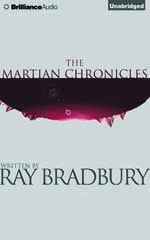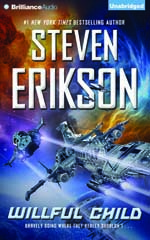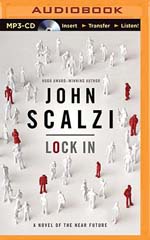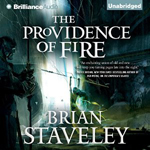
 An Unwelcome Quest (Magic 2.0, Book 3)
An Unwelcome Quest (Magic 2.0, Book 3)
By Scott Meyer; Narrated by: Luke Daniels
Publisher: Brilliance Audio
Publication Date: 10 February 2015
[UNABRIDGED] – 11 hours, 46 minutes
Themes: / hacker / time travel / fantasy / humor / wolves / wenches / wastelands /
Publisher summary:
Ever since Martin Banks and his fellow computer geeks discovered that reality is just a computer program to be happily hacked, they’ve been jaunting back and forth through time, posing as medieval wizards and having the epic adventures that other nerds can only dream of having. But even in their wildest fantasies, they never expected to end up at the mercy of the former apprentice whom they sent to prison for gross misuse of magic and all-around evil behavior.
Who knew that the vengeful Todd would escape, then conjure a computer game packed with wolves, wenches, wastelands, and assorted harrowing hazards – and trap his hapless former friends inside it? Stripped of their magic powers, the would-be wizards must brave terrifying dangers, technical glitches, and one another’s company if they want to see Medieval England – and their favorite sci-fi movies on VHS – ever again. Can our heroes survive this magical mystery torture? Or will it only lead them and their pointy hats into more peril?
Review:
Executive Summary: This series is a lot of fun, and this book might be the best yet. I really hope we’ll get a 4th book.
Audio book: What more can I say about Luke Daniels? I said he’d be good at reading the phone book, and he obliged me. I bet he’d even do a good job of the Begats. He brings this book to life. It may as well be a radio play. Do yourselves a favor and do this book in audio.
Full Review
I sort of fell into this series by accident last year. It’s not going to be winning any awards or anything, but if you want a fun and light series, look no further.
I thought that while the second book addressed my complaints about the lack of women from the first book, the plot and the humor were weaker. This book seems the most polished yet. While probably not as funny as the first book, it’s definitely the best written. The characters are more developed, the plot is tighter, and in general I was always excited to to start listening again.
If you’ve ever played buggy video games, or written buggy code, I think you’ll especially find a lot to like here. I like how some of the supporting characters from Off to Be the Wizard that mostly took a backseat in Spell or High Water were not only more heavily featured, but really had a chance to shine. I especially enjoyed Tyler’s running commentary throughout the book.
That said, my favorite character continues to be Phillip. Especially when he’s talking to Jimmy. And Jimmy of course is as great as ever.
If you liked the first two books, definitely give this one a try. And if you haven’t given this series a try yet, you really should. It’s a lot of fun, and I really hope we’ll get more of them.
Review by Rob Zak.
 The Martian Chronicles
The Martian Chronicles Plague Year (Plague #1)
Plague Year (Plague #1) Willful Child
Willful Child Lock In
Lock In The Providence of Fire (Chronicle of the Unhewn Throne #2)
The Providence of Fire (Chronicle of the Unhewn Throne #2)